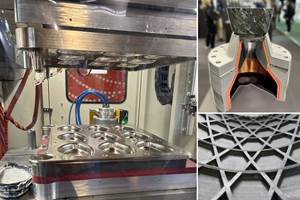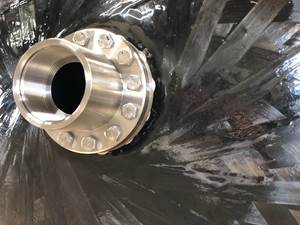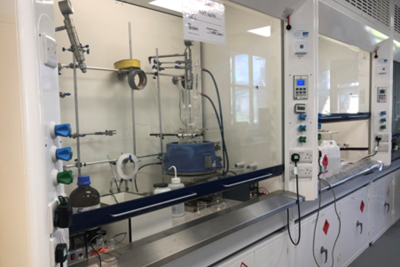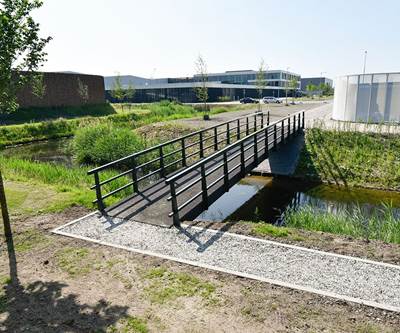Demonstrating recyclable, bio-based autocomposites
The ECOXY research consortium recently developed a demonstrator automotive part constructed from recyclable flax fiber and a specialized bio-based epoxy.
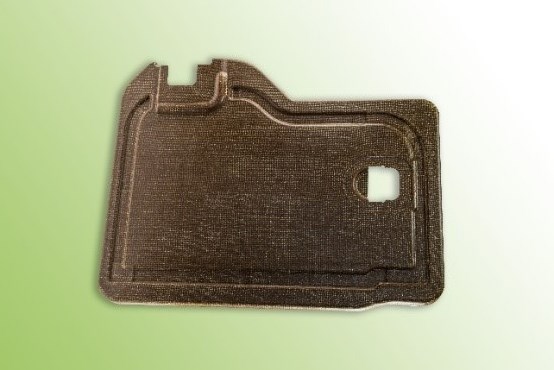
A demonstrator rear seat back panel developed using flax fiber-reinforced bio-based epoxy. Source | Fraunhofer ICT
A recent consortium-led research project proposes new, more sustainable composite materials for automotive applications. is a European Union (EU)-funded consortium made up of 13 research and industry partners working to develop recyclable, reshapeable and repairable bio-based polymers for use in composite parts for the automotive and construction industries. In July, Fraunhofer Institute for Chemical Technology (ICT, Pfinztal, Germany) announced that the consortium has successfully developed a demonstrator rear seat back panel made of a bio-based composite.
According to ICT, the project addresses two sustainability challenges to the automotive industry simultaneously: lightweighting to reduce fuel consumption, and recyclability. For project partner Centro Ricerche Fiat (CRF, Orbassano, Italy), targets included both weight reduction for the part and cost reduction for the part manufacture. “If we substitute the steel panel with a polymer panel, we obtain the weight reduction of 56%, which means that the complete backrest is around 1.5 kilograms lighter,” says Enrico Mangino, representative from CRF.
In the automotive sector, however, weight reduction often leads to increased material or process costs. According to ICT, the ECOXY project’s aim was to maintain the same cost or even reduce the total cost of part production by optimizing the process and using a recyclable material without sacrificing part performance — which in this case means prioritizing passenger safety. The rear seat back panel must be able to protect the rear passenger from displaced luggage in the case of a front crash, and must be resistant to heavy loads.
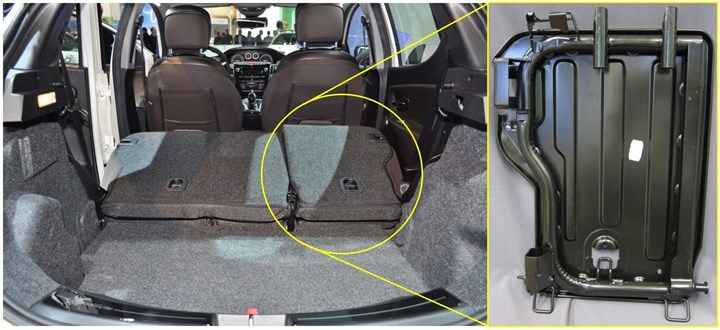
The original steel rear seat back panel and its placement within the Lancia Y vehicle. Source | Fraunhofer ICT
According to ICT, composites are often already used for these types of structural applications due to their low weight and high mechanical properties, mostly in the form of fiber-reinforced thermoset epoxy materials. “However,” says Rainer Wendel, researcher at ICT, “due to their highly cross-linked architecture, thermosets cannot be reprocessed, and are very difficult to be repaired and recycled.” Thermoset-based composites are usually disposed of as waste or incinerated at the end of their use life, ICT says.
The ECOXY consortium was able to develop a rear seat back panel that is lightweight, cost-effective to produce and recyclable through the combination of flax fibers and a bio-based epoxy resin developed by consortium partner Specific Polymers (Castries, France). Plus, Wendel adds that the consortium’s bio-based composites are highly repairable and reprocessable as well as recyclable.
The bio-based epoxy resin, ICT says, incorporates the use of “dynamic” hardeners — meaning the compounds are, unlike traditional hardeners, based on reversible covalent bonds that under certain temperature and pressure conditions will rearrange while keeping the crosslink density (and associated mechanical properties). According to ICT, ECOXY’s resins research is spearheaded by recent developments of consortium partner Cidetec (San Sebastián, Spain), which has recently patented a family of thermoset epoxy resins using reversible chemistry.
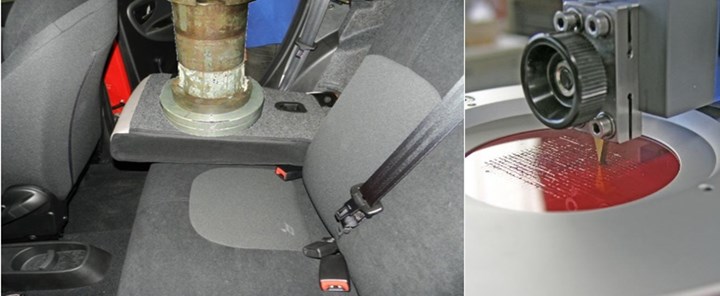
The ECOXY consortium partners conducted a series of tests on the demonstrator panel, including an overweight misuse test (left) and Erichsen scratch resistance test (right). Source | Fraunhofer ICT
Within this project, scientists from ICT have produced rear seat back panels made of bio-based composites for the Italian compact car Lancia Y using a wet compression molding process. In addition to the mechanical properties, the ECOXY panel also fulfills aesthetic requirements, ICT says — leading to additional weight reduction, as no textile covering is needed. Scratch and UV tests have ensured the resistance of the developed material.
The ECOXY project is still ongoing. Once completed, ICT says the goal is for more automotive parts, such as vehicle roof or hood panels, to be produced in more sustainable bio-based composites.
For more information about ECOXY, visit .
Related Content
JEC World 2024 highlights: Thermoplastic composites, CMC and novel processes
CW senior technical editor Ginger Gardiner discusses some of the developments and demonstrators shown at the industry’s largest composites exhibition and conference.
Read MorePlant tour: Airbus, Illescas, Spain
Airbus’ Illescas facility, featuring highly automated composites processes for the A350 lower wing cover and one-piece Section 19 fuselage barrels, works toward production ramp-ups and next-generation aircraft.
Read MoreInfinite Composites: Type V tanks for space, hydrogen, automotive and more
After a decade of proving its linerless, weight-saving composite tanks with NASA and more than 30 aerospace companies, this CryoSphere pioneer is scaling for growth in commercial space and sustainable transportation on Earth.
Read MoreDevelopment of a composite liquid hydrogen tank for commercial aircraft
Netherlands consortium advances cryogenic composites testing, tank designs and manufacturing including AFP, hybrid winding, welding of tank components and integrated SHM and H2 sensors for demonstrators in 2025.
Read MoreRead Next
Scott Bader joins CHAMPION project to research novel bio-based polymers
The bio-based polymers aim to replace conventional polymers in a variety of applications and promote alternative to end-of-life waste.
Read MoreBio-based composite bridge in The Netherlands
This summer, FiberCore Europe joined forces with TU Delft and Schiphol Logistics Park, and other firms and local agencies, on the design and construction of an ecologically sustainable composite footbridge made with bio-based materials.
Read MoreBio-based recyclable, reshapable and repairable (3R) fiber-reinforced epoxy composites wins award
ECOxy consortium researchers recognized at the 2018 International Conference on Recycling of Textiles and Plastics.
Read More.jpg;width=70;height=70;mode=crop)






